 Petzlover
Petzlover Dachshund is originated from Germany but Miniature English Bulldog is originated from United Kingdom. Dachshund may grow 7 cm / 2 inches shorter than Miniature English Bulldog. Both Dachshund and Miniature English Bulldog are having almost same weight. Dachshund may live 3 years more than Miniature English Bulldog. Dachshund may have more litter size than Miniature English Bulldog. Dachshund requires Low Maintenance. But Miniature English Bulldog requires Moderate Maintenance
Dachshund is originated from Germany but Miniature English Bulldog is originated from United Kingdom. Dachshund may grow 7 cm / 2 inches shorter than Miniature English Bulldog. Both Dachshund and Miniature English Bulldog are having almost same weight. Dachshund may live 3 years more than Miniature English Bulldog. Dachshund may have more litter size than Miniature English Bulldog. Dachshund requires Low Maintenance. But Miniature English Bulldog requires Moderate Maintenance
 The Dachshund originated in Germany. He was used as a hunting dog with his origins starting way back in the 15th century already. The small dog was developed to hunt for animals that buried themselves deep underground such as badgers. The shape of the dog and his courage and bravery allowed him to take on the badger.
The Dachshund originated in Germany. He was used as a hunting dog with his origins starting way back in the 15th century already. The small dog was developed to hunt for animals that buried themselves deep underground such as badgers. The shape of the dog and his courage and bravery allowed him to take on the badger.
There has been a lot of debate as to whether the Dachshund is a hound or terrier, and it was decided that the Dachshund is a hound that became a terrier, and which displays some of the best qualities of both.
It was in 1881 that the Dachshund Club of England was formed and the German Deutscher Teckelklub was formed in 1888. The small dog gained popularity in America and the Dachshund Club of America was founded in 1895.
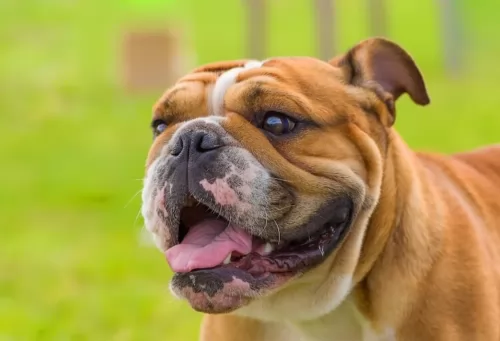 The Miniature Bulldog is such a cute little dog, hailing from England in the 18th and early 19th centuries. The exact development of the dog is unclear and it seems as though the breeders weren’t working together and were working in two different directions.
The Miniature Bulldog is such a cute little dog, hailing from England in the 18th and early 19th centuries. The exact development of the dog is unclear and it seems as though the breeders weren’t working together and were working in two different directions.
There is a lot of debate about the very name ‘miniature’ too because some breeders gave this name to a hybrid mix of a Pug and Bulldog. It seems some breeds were created by crossing English Bulldogs with French Bulldogs to decrease their size. Certainly the origins for the Miniature Bulldog are unknown and there isn’t one particular breeder who can be credited with developing the breed.
Because the Miniature Bulldog is a hybrid breed, it isn’t accepted by the AKC, but it is accepted by the American Canine Hybrid Club as well other registries.
 Known as Badger Dogs, Sausage Dogs or Doxies, the Dachshund is known for his long body, his sharp, pointed face and the short legs with the large front paws.
Known as Badger Dogs, Sausage Dogs or Doxies, the Dachshund is known for his long body, his sharp, pointed face and the short legs with the large front paws.
He stands at about 21-28 cm while the female may be 20-25 cm and weighing 6 to 15kg. He is the smallest of the hound dogs, with the standard size dachshund being developed to scent and chase badgers and other animals.
There are different Dachshund coat varieties – the smooth coat, the long-haired Dachshund and the wire-haired dachshund. They also come in a number of solid colors such as brown, red, tan, chocolate and black.
The dachshund is an energetic,social little dog with a loving personality. He’ll love to lie as close as possible to you on the couch and be with you wherever you are. Training and socialization is important so he doesn’t become too protective so that he wants to go for anyone who comes near.
He can be stubborn but he is also protective of his human family. Dachshunds are known for their tendency to bark but training and socialization can help tremendously to make him obedient and relaxed around humans and pets.
He is small enough to be a great pet in the city or in the country. He loves to spend time indoors- as well as outdoors. He can become a loving companion and gets on well with children and pets in the house. In spite of his small size, he makes a good watchdog.
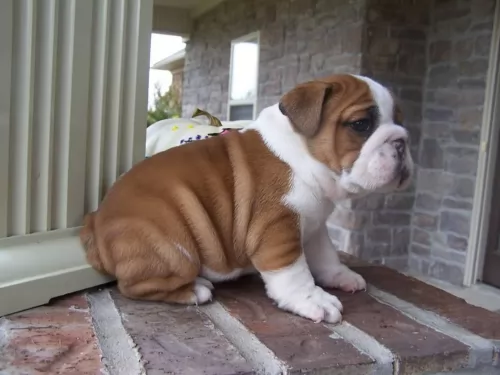 Because the Miniature Bulldog is a cross between two purebred breeds – the Pug and the English Bulldog. You can expect different looks and characteristics from each breed.
Because the Miniature Bulldog is a cross between two purebred breeds – the Pug and the English Bulldog. You can expect different looks and characteristics from each breed.
Your mini Bulldog is a small breed dog standing between 25 and 35cm male and female and weighing between 11 and 18kg. The average litter size for these dogs is about 4 puppies.
The Miniature Bulldog has a short coat which sheds moderately and that comes in different colors such as tan and white, brindle, with black and grey also having a show in.
The Miniature Bulldog is a social, friendly breed who is able to get on well with all members of the family, including children and pets in the home. His very stature makes it that he isn’t the most active of dogs, but nonetheless you still want to exercise him and take him for walks to avoid obesity.
As with all dogs, training and socialization are imperative because this is a strong-willed dog who wants to go his own way.
 The Dachshund may be small but he is courageous, brave and loyal. He gets on well with children and pets in the home but care needs to be taken because of his long back.These dogs are prone to disk problems so you have to be careful with rough and tumble from children.
The Dachshund may be small but he is courageous, brave and loyal. He gets on well with children and pets in the home but care needs to be taken because of his long back.These dogs are prone to disk problems so you have to be careful with rough and tumble from children.
Dog experts say that the different kinds of Dachshunds produce different personalities and that the longer-coated one is more amicable than the short-coat variety. Whichever variety you choose, they are guaranteed to entertain and delight you and be a loyal, loving companion.
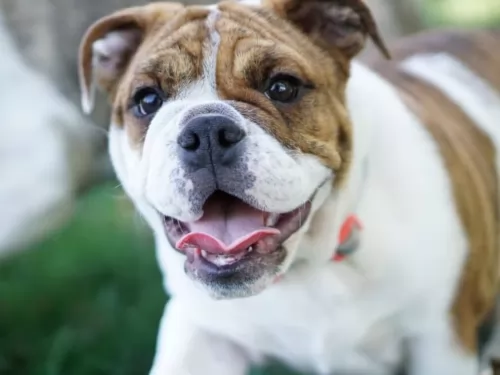 You’ll love having one of these entertaining, friendly dogs by your side. He is docile, social, fun and a bit stubborn too but he is able to get on well with children in the home as well as with other pets.
You’ll love having one of these entertaining, friendly dogs by your side. He is docile, social, fun and a bit stubborn too but he is able to get on well with children in the home as well as with other pets.
He can adapt to life in the city as well as in the countryside as he doesn’t require too much exercise.
Take special care of him and he’ll make you a splendid family pet.
 The life expectancy of the Dachshund is 12 to 16 years. With good care which includes good nutrition he can reach mature years. However there are always some dog diseases that are worth knowing about so that you can steer your pet away from them.
The life expectancy of the Dachshund is 12 to 16 years. With good care which includes good nutrition he can reach mature years. However there are always some dog diseases that are worth knowing about so that you can steer your pet away from them.
One of these is obesity, and the Dachshund is prone to developing obesity. Never overfeed him and ensure he gets his regular exercise which can be walks and ball games. Check with your vet if you’re unsure about how to feed him. Essentially, the amount of food you give a dog depends on the size of your dog, his age and his activity levels.
Be sure to provide high-quality food and monitor his intake. Your vet is always there to advise on the correct food and amount that can help him remain healthy.
Unfortunately, this dog’s shape – the long back – makes the dog more prone to disc herniation. With some Dachshunds having a gene that creates mineral deposits in the discs in the spine, the risk of herniation is higher.
A large percentage of dachshunds have intervertebral disc disease. Encourage your Dachshund not to jump down off a bed or couch, but rather provide some steps for him to get to out of reach places.
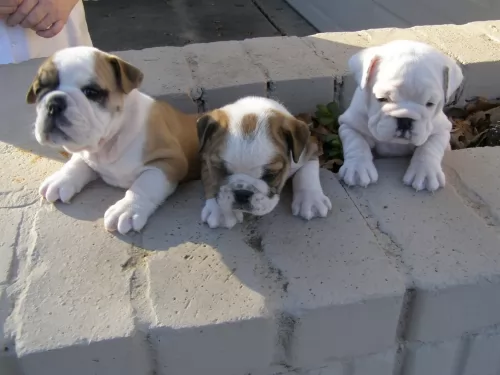 Unfortunately the origins of the Miniature English Bulldog are not 100% clear and therefore other important information isn't readily available.
Unfortunately the origins of the Miniature English Bulldog are not 100% clear and therefore other important information isn't readily available.
These dogs are always prone to breathing and nasal abnormalities because of the shape of their faces as well as being prone to heart deficiencies. Snoring, grunting and quite a bit of panting is part and parcel of the mini English Bulldog.
They’re also prone to overheating, cherry eye and hip dysplasia. It is most unlikely that your Miniature English Bulldog is going to get any of these illnesses and the good news is that he can live to be up to 12 years of age.
 The Dachshund is a medium shedder and if you choose the short haired dog, you’re going to have a low maintenance pet.
The Dachshund is a medium shedder and if you choose the short haired dog, you’re going to have a low maintenance pet.
The long haired Dachshund will require more regular brushing but the short-haired Dachshund is a low maintenance dog that will require a brush once a week.
While brushing him, you can be checking his ears and nails at the same time. All dogs with floppy ears need to have them checked for ear infections. Also, maintain good oral hygiene with your Dachshund by brushing his teeth 2 or 3 times a week.
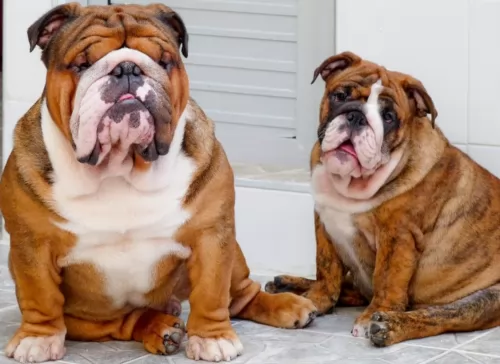 Feeding the Miniature English Bulldog is hugely important. It is imperative that he doesn't become obese. Buy the best dog food there is and see to it that he also gets some home-made food. Chop up boiled chicken, brown rice ad vegetables for your pet and mix occasionally into his dry kibble.
Feeding the Miniature English Bulldog is hugely important. It is imperative that he doesn't become obese. Buy the best dog food there is and see to it that he also gets some home-made food. Chop up boiled chicken, brown rice ad vegetables for your pet and mix occasionally into his dry kibble.
Dogs love simple food – their stomachs can’t cope with different foods. They appreciate consistency with uncomplicated but nutritious foods. The bulldog is a dog which can easily overheat, so make sure he has constant access to fresh cool drinking water. On a hot day you can even use a spray bottle and allow some spray mist sprayed into his face to cool him down.
The Mini English Bulldog is a dog that sheds so you will need to brush him at least twice a week to get rid of loose hair.
Check around his eyes and inside his ears for infection.
Brush his teeth 2 or 3 times a week to get rid of plaque so as to prevent dental decay which can be detrimental to his health.
His face and body have wrinkles, making him more susceptible to skin allergies and you’ll need to keep your eye open for these as they can be terribly painful and frustrating for your pet.
Keep his nails trimmed.
He is neither sleek, agile or quick and you can see just by looking at him that he isn’t designed for being sporty. A slow walk every day will be enough for him as well as some easy-going games inside.